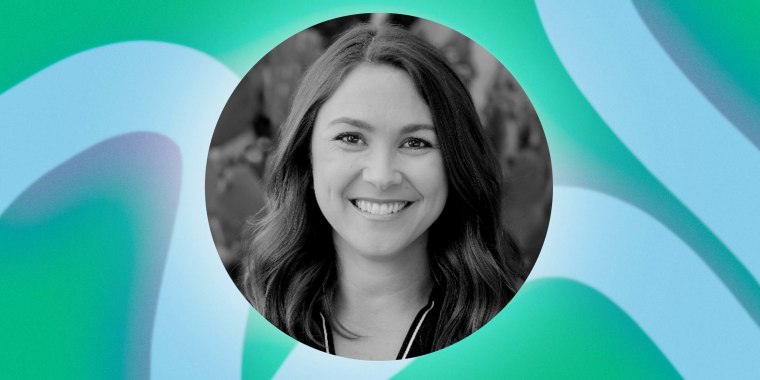In honor of Pride Month, NBC Out is highlighting and celebrating a new generation of LGBTQ trailblazers, creators and newsmakers. Visit our full #Pride30 list here.
When Katelyn Cooper, 34, was an undergraduate student studying biochemistry at Arizona State University, she was afraid to come out as gay. She said this was largely because science classrooms and labs have traditionally been seen as objective spaces where “who you are doesn’t matter.”
“It felt pretty lonely as an undergrad,” Cooper told NBC News. “I remember admiring so many of my instructors in science and looking for any sign that anyone else maybe didn’t identify as straight or cisgender, because I just wanted some example of someone who had made it in science as an LGBTQ+ person.”
Now an assistant professor in the school of life sciences at Arizona State University with a doctorate in biology, Cooper is conducting nationally funded research into how to create more inclusive learning environments for biology students at the college level. The Cooper Biology Education Research Lab, which she founded in 2019, focuses on understanding how students’ identities and mental health affect their experiences in biology education.
The goal isn’t just to make classrooms more inclusive, she explained, but to bring more diversity to a field that has traditionally been dominated by straight white men.
“If people can bring different perspectives to the table, then we’re doing a better job of counteracting biases, and that results in much more robust science,” she said. “That’s really what led me to want to sustain this line of research looking at how to create more inclusive environments for LGBTQ+ people.”
Cooper knows from experience what a difference being in an inclusive learning environment can make. She said her former doctoral adviser was the first openly LGBTQ mentor she had, a relationship that finally allowed Cooper, a teaching assistant in her late 20s at the time, to feel safe enough to come out. After observing one of her then-students, who was transgender, get repeatedly misgendered in class, Cooper was inspired to start her lab.
“I really wanted to understand how learning science impacts LGBTQ students,” she said. “I dove into the literature, and surprisingly, there was no research in this area, so we decided to do it ourselves.”
Cooper and fellow researchers have produced several major studies investigating the challenges of being an LGBTQ student or educator in a biology classroom. They have also developed recommendations for how educators can make their biology classrooms more inclusive.
“We’ve really seen a lot of instructors adopt the small changes that can have really big impacts for their college students who identify as members of the LGBTQ+ community,” she said.
They also received a grant from the National Science Foundation to investigate the impact of an LGBTQ biology instructor coming out to her students. That study was published in May. Cooper said the grant shows how much this field has grown.
“We went from doing one small study in one class in one institution to now having national funding to do national studies at scale across the United States,” she said.
Cooper said science educators can make their classrooms more inclusive by being openly supportive of LGBTQ students. Educators can, for example, put an inclusivity statement on their syllabus or website, foster safe environments for students to reveal their LGBTQ identities and familiarize themselves with on-campus LGBTQ resources in case students come to them for support.
She said seeing the impact of her work is “incredible” and “such a privilege.”
“I went from being this closeted undergraduate who never dreamed of coming out to this person who gets to carry out this research on behalf of our LGBTQ+ community and go to work every day doing research that I believe in,” she said.
Cooper said Pride Month for her means being able “to advocate for something greater than myself, and to advocate for our rights and our privileges as LGBTQ+ individuals, and to be really proud of this identity and the progress that we’ve made, and to look forward to more progress over the years to come.”

